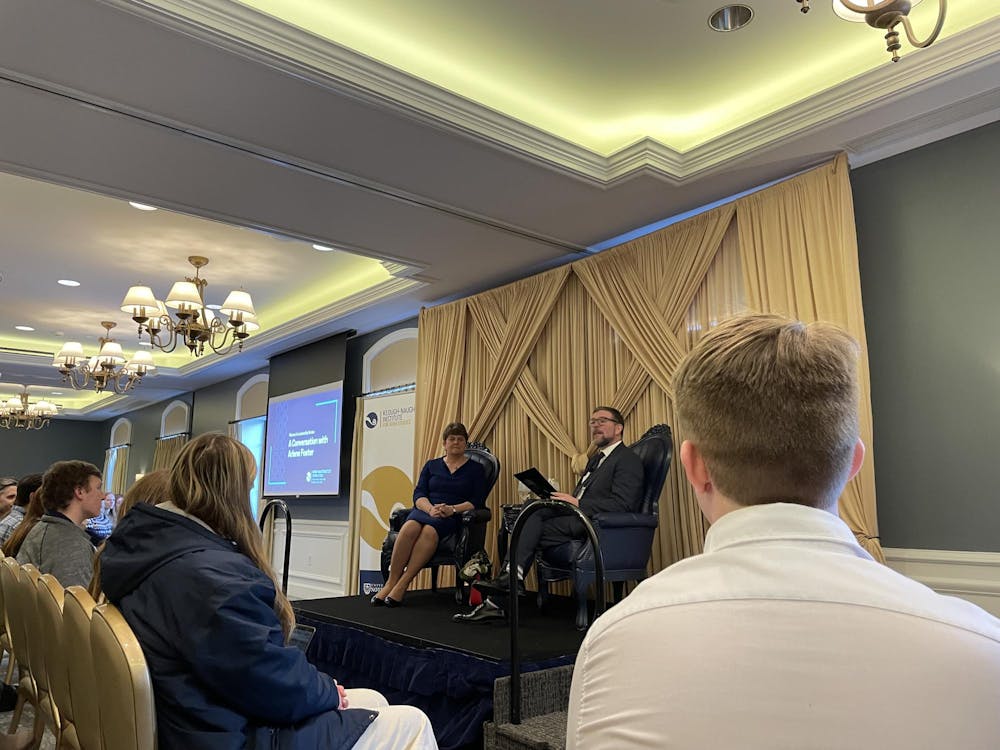On Thursday evening in the Morris Inn, former first minister of Northern Ireland Arlene Foster spoke with professor Colin Barr, a historian of modern Ireland, about the struggles of women in leadership roles and the current political situation in Northern Ireland. The discussion was sponsored by the Keough Naughton Institute for Irish Studies and is the first in a series of conversations on women in leadership.
Barr described Foster, who served as first minister of Northern Ireland with the Democratic Unionist Party (DUP) from 2016 to 2017 and again from 2020 to 2021, as a “trailblazer” for women in politics in both Northern Ireland and the Republic of Ireland. The DUP is a unionist, loyalist party, which means that it wants Northern Ireland to remain in the United Kingdom rather than joining the republic and is historically supported by Protestants.
Foster acknowledged the lack of women in leadership positions in Northern Ireland when she began her political career in the late 1990s, especially in unionist circles.
“I think I was always a bit of an anomaly in unionist politics,” she said.
While Foster described working in politics as “incredibly rewarding,” she also noted how women politicians tend to receive more attacks and abuse on social media than men, often including sexual remarks and attacks on their appearances. Foster condemned such attacks as “dehumanizing.”
Nonetheless, Foster encouraged young women “to build up your resilience” to deal with unfair criticism and pointed to her “faith, friends and family” as refuges for her when she faces attacks.
“I will always encourage women [and] young women to get involved,” she said.
As a child, Foster’s father was nearly assassinated by the Irish Republican Army (IRA) and when she was 17, her school bus was attacked by the group. While Foster emphasized she had always had an interest in politics, she pointed to these events as motivating factors for her entrance into political life.
Foster elaborated on her notable opposition to the Good Friday Agreement, also known as the Belfast Agreement, which largely brought an end to the violence of “The Troubles” in Northern Ireland. The agreement, along with establishing a devolved government in the north with executive power shared between the major parties, also involved the release of some IRA members who had been convicted of terrorism.
While Foster found it difficult to oppose the agreement, she stressed, the release of these prisoners was a line that she could not cross.
“It was actually a really difficult thing to go against the leadership and say, ‘No, sorry. We want an agreement, but we don’t want an agreement that doesn’t deal with victims’ issues and actually releases prisoners from our jails,’” she said. “It was a step too far in terms of the law and in terms of morals.”
Foster began her career as a member of the Ulster Unionist Party before switching her affiliation to the Democratic Unionist Party in 2004. Foster currently serves as a non-affiliated peer in the House of Lords.
Foster, an Anglican, described moving to the heavily evangelical and presbyterian Democratic Unionist Party as “incredibly difficult,” but ultimately worthwhile.
“It’s not about free Presbyterianism, it’s not about the religion, it’s about the political issues around the implementation of the agreement,” she explained.
Foster noted the difficulty of sharing power when she initially became first minister in 2016 with then-deputy first minister Martin McGuinness, a member of the republican Sinn Féin party that had supported the IRA.
“A lot of the victims community found it very difficult that I, as a victim of IRA terrorism, would share power with Martin McGuinness, who was responsible for a lot of the victim making,” she said. “It was a challenge, but I believe that was the right thing to do because we wanted to move Northern Ireland forward.”
Foster explained why she feels so strongly about the unionist cause.
“For me, my interest in unionism, of course, has grown over the years to make it the rational political ideal to remain within the United Kingdom and to get the benefits from that, whether it’s cultural politics, economics, [or] national shared institutions,” she said.
Foster also discussed the complexity of national and cultural identity in Northern Ireland.
“What you have to remember about Northern Ireland is there are numerous identities and sometimes very layered, as they are with me,” she explained. “I’m Northern Irish, I’m British, and culturally, I’m British.”
While many view the political issues in Northern Ireland as a conflict between Catholics and Protestants, Foster said, the reality is more complex.
“There is a cohort of Catholics that would hope to remain within the United Kingdom,” Foster noted. “There’s this excitement that because there’s more Catholics, there’s going to be a united Ireland, but that’s not actually the situation on the ground.”
Looking to the future of Northern Ireland, Foster expressed hope in a functioning devolved government. The devolved government in Northern Ireland is set to return in the coming months for the first time since February 2022 when the Democratic Unionist Party refused to enter into government.
“The focus should be on why we need to stay in government and why we need to work together as opposed to finding technical ways to stop it,” she stressed.
Foster also urged unionists to effectively promote the benefits of being in the United Kingdom to the people. Currently the largest political party in both Northern Ireland and the Republic of Ireland is Sinn Féin, which favors a united Ireland.
While promoting the unionist cause, Foster also emphasized the necessity for good relations between Northern Ireland and the Republic of Ireland.
“[It’s] like two separate thatched houses, living together. If something happens in one of the houses it will have an impact on the other house. But it’s living and coexisting together in a way that we can both get on with each other,” she said.










